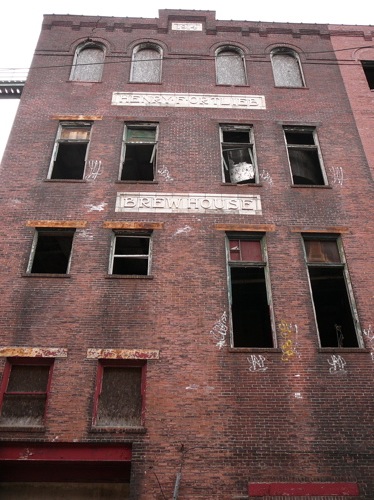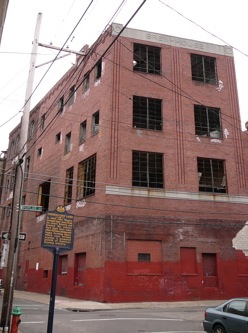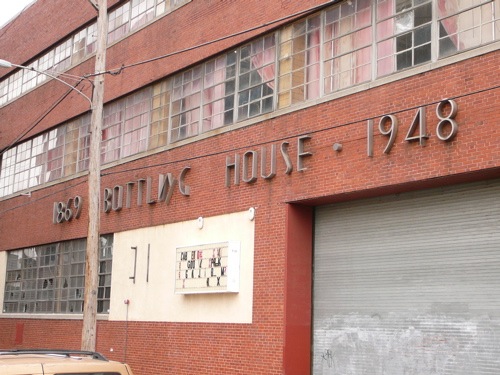

Henry F. Ortlieb Brewing Company (1863-1868, 20th C. additions)
847 North 3rd Street, Philadelphia PA 19123
832-852 North American Street
829-851 North American Street
© Roy E. Goodman and David G.
Orr, Ph.D., Workshop of the World (Oliver Evans Press,
1990).
Ortlieb was founded by August
Kuehl in the early 1860s. 1
It changed hands
in 1869 and 1885 and was ultimately purchased by Henry
Ortlieb in 1893. Ortlieb's employed 119 people in
1943. 2
The company
acquired Kaier brand (1966), Neuweiler (1974) and also
marketed McSorley's Ale which had been produced by
Rheingold. By the late 1970s, President Joseph Ortlieb's
television ads, for "Joe's Beer," epitomized the plight
of the small local brewer competing with the national
firms.
In 1981, Christian Schmidt Brewing Company bought the
brand and shifted production of Ortlieb’s to the
Schmidt Brewery. Ortlieb’s is currently brewed in
Baltimore, after passing from G. Heileman Brewing Co., of
LaCrosse, Wisconsin, (the purchases of Christian Schmidt
in 1987) to an Australian firm.
However, Joe Ortlieb's Trupert brand, named after his
grandfather, is a high quality “micro” beer,
produced under contract by the Lion Inc., the
Wilkes-Barre (PA) maker of the Stegmaier and Gibbons
labels. “Micro” beers are a new type of
specialty beer, made from particular recipes or formulas
in small quantities for the beer and ale connoisseur.
The first lager beer brewed in America, by John Wagner, a
Bavarian emigre brewmaster in 1840, occurred at his
residence at 3rd and Poplar. Perhaps this site should be
enshrined by beer devotees. In the interim, one can enjoy
a brew at the Ortlieb's Jazzhaus on 847 N. 3rd Street, a
vestige of a proud Philadelphia
tradition.
1 From 1853-1895 Philip
Guckes [sic], 822/834 St. John Street (N. America Street)
Donald Bull, et. al, American Breweries, Trumbull, CT.,
1984. See Hexamer General Survey #369 (1869) "Philip
Gukes, Ale & Porter Brewery & Malt
House."
2 William L.
Downard, Dictionary
of the History of the American Brewery and Distilling
Industries , (Westport, CT., 1980),
pp. 170-171.

Update May
2007 (by
Torben Jenk):
In
1997, Henry Ortlieb, a fifth-generation descendant of the
founder, after raising $4 million, opened the "Poor
Henry's Brewpub" in the cavernous two-story building
with its tiled interior walls, and "ribbon windows."
Stainless steel lettering outside proclaims its former
use: "1869•Bottling House•1948." Poor Henry's
beer was brewed on site and decent pub fare was offered,
but it opened too early, before the restaurant and bar
renaissance in Northern Liberties. Also, the building was
hard for many to find among the various one way streets.
Investors pulled the plug on Poor Henry's in 2000. Henry
went on to open Ortlieb's Brewery & Grille in
Pottstown, but he was killed in a boating accident in
2004. A wide metal staircase was added on the north side
of the Bottling House to Poplar Street, as an entrance
and fire egress, so the second floor could be used for
boxing and performing arts events. This building is now
vacant, but stable. Last sold in 2003, the huge spaces
are not easily converted to residential use.
838-852 N. American Street (southwest corner of American
and Poplar streets) comprises three buildings. To the
south along American Street, ivory-colored terra cotta
lettering set within the red brick proclaims "1914,"
"HENRY F. ORTLIEB" and "BREW HOUSE." On the corner
building, made with hard orange bricks, limestone-colored
cast stone elements proclaim, "1946" and "BREW-HOUSE."
Further west along Poplar Street, after a gap from
demolition, and of the same construction is the
"STOCK-HOUSE." These buildings are in very poor shape. No
glass remains in the windows, the masonry is bulging, and
rust covers the steel frame. These buildings are likely
to be demolished as was the section of the brewery that
stretched to N. 3rd Street (between Ray King's studio at
835 and Ortlieb's Jazz House at 847). That 3rd Street
section had a beautiful facade of vitrified Roman
ironspot brick.
Brewmaster Joe Ortlieb, who still lives in the
Philadelphia area, claimed in his 1970s television
advertising,
"In the beer business, when you bump another brand
out of a bar, it's called 'knocking off a spigot.' Those
big guys can knock off my spigots, but they can't knock
off my taste."